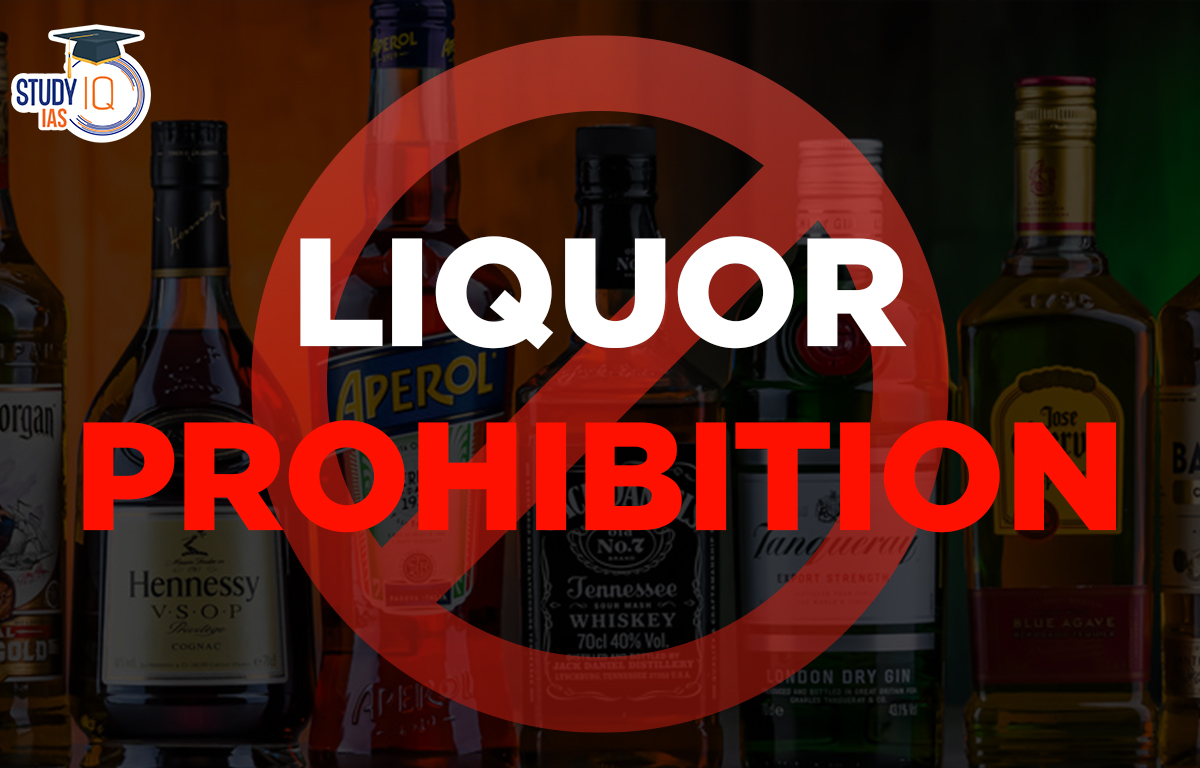Table of Contents
Prohibition in India
- Meaning: Prohibition is the act or practice of forbidding something by law; more particularly the term refers to the banning of the manufacture, storage, transportation, sale, possession, and consumption of alcoholic beverages.
- Constitutional Provisions:
- Article 47: The Directive Principle in the Constitution of India states that “The state shall undertake rules to bring about prohibition of the consumption except for medicinal purposes of intoxicating drinks and of drugs which are injurious to health”.
- State Subject: Alcohol is a subject in the State list under the seventh schedule of the Indian Constitution. Thus, laws regarding alcohol differ from state to state.
- Prohibition Landscape in India:

Arguments in Favour of Prohibition
- Impact on livelihoods: Alcohol denudes family resources and reserves, creates economic stress and leaves women and children as its most vulnerable victims. Thus prohibition will have a positive effect on livelihoods.
- The 1992 Anti-arrack movement that took place in Andhra Pradesh is a testimony to this. A study pointed out that 19% of households acquired new assets from the money they earlier splurged on alcohol.
- Women’s rights: Alcohol consumption is often linked with domestic abuse or domestic violence. And there is some evidence to suggest that prohibition has a positive impact on women rights.
- A report by the Sexual Violence Research Initiative says that after prohibition was introduced in Bihar in 2016, “crimes against women have clearly declined both in terms of rate and incidence.”
- Health Benefits: According to the WHO, the harmful use of alcohol is a causal factor in more than 200 disease and injury conditions and globally 3 million death occur every year due to harmful use of alcohol (5.3% of all deaths).
- Discourage Regular Consumption: Strict state regulation is imperative to discourage regular and excessive consumption of alcohol.
Arguments Against Prohibition
- Loss of revenue: Liquor revenues are not easy to ignore and have consistently contributed a large share of state governments’ revenue. Absence of these revenues may severely impacts state’s ability to run public welfare programmes.
- For instance, in Maharashtra, state liquor revenues amounted to Rs 11,000 crore in April 2020 (during the nationwide Covid lockdown), compared with Rs 17,000 crore in March.
- Underground economy: Prohibition creates opportunities for a thriving underground economy that distributes liquor, outside the regulatory framework of the state.
- This creates its own problems, from strengthening organised crime groups (or mafias) to the distribution of spurious liquor.
- Right to Choice: A total ban goes against an individual’s right to choice and undermines a person’s freedom.
- Loss of employment: The Indian Made Foreign Liquors (IMFL) industry supports the livelihood of 35 lakh farming families and provides direct and indirect employment to lakhs of workers employed in the industry.
- Health impacts: Many people lose their lives by consuming poor quality illicit liquor (hooch).
- According to the data, India reported over 6,000 deaths in 5 years between 2016 and 2020 due to the consumption of spurious liquor.
- Populist measure: Critics argue that Alcohol prohibition is merely used as a political card, especially to woo women voters.
- Judicial Burden: It creates tremendous burden on the courts and enhances the pendency of cases e.g., till February 2020, around 2.14 lakh cases were registered under Bihar Prohibition and Excise Act, 2016.


 Personality Rights in India: Expanding P...
Personality Rights in India: Expanding P...
 Judicial Recognition of Child Traffickin...
Judicial Recognition of Child Traffickin...
 Misrepresentation and Fraud in Digital T...
Misrepresentation and Fraud in Digital T...

























